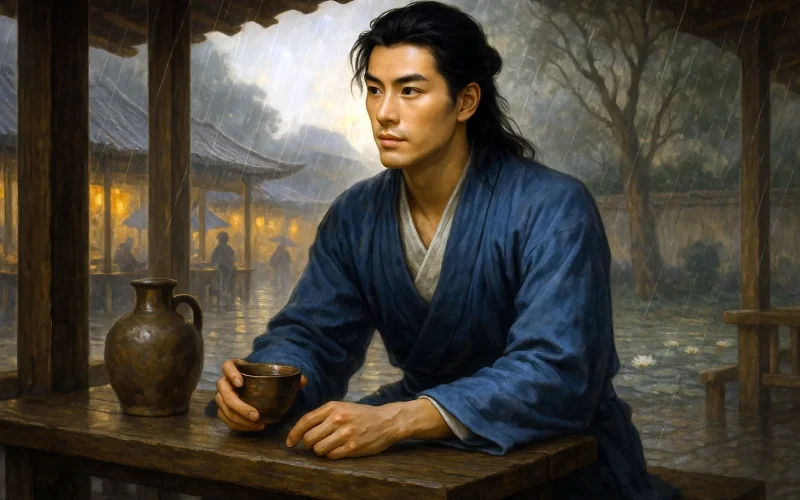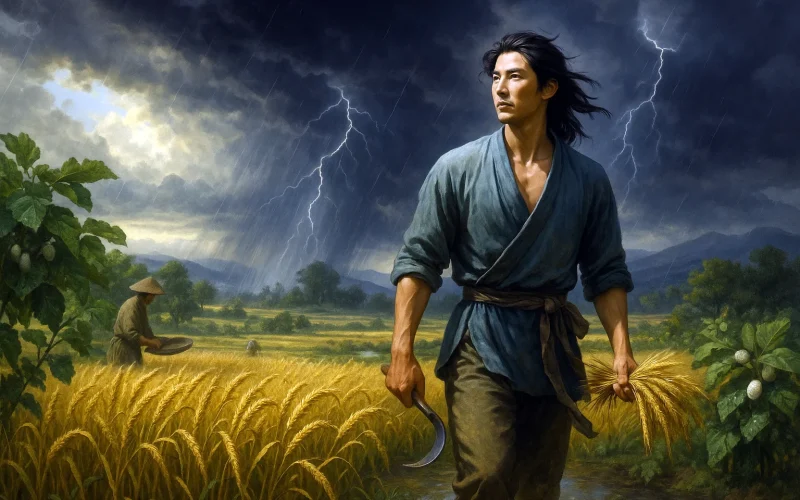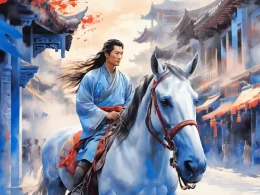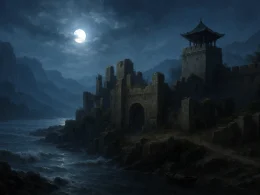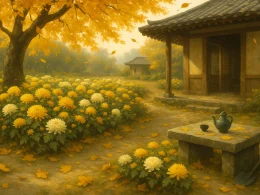Most dread the far lakes-and-streams,
But solitude fits my themes.
Fading tracks won't startle crowds,
Leaving noise defies time's shrouds.
Roaming's an art one can copy,
Wild greens guard my private recipe.
Why drop your homeward-bound oar,
To be whipped by frost's harsh law?
Original Poem
「江湖」
曾巩
江湖俗畏远,幽好自相宜。
沦迹异惊众,辞嚣如避时。
优游可以学,薇蕨易为私。
胡然弃回櫂,霜雪有驱驰。
Interpretation
Composed during Zeng Gong's tenure as a local official (though the exact date remains uncertain), this work embodies his characteristic transcendental spirit and Confucian concern for worldly affairs. While serving as a bureaucrat, Zeng frequently yearned for retreat into nature's solitude. His concept of "rivers and lakes" (江湖) represents neither the wanderer's domain nor the hermit's refuge, but rather the literati's inner sanctuary of tranquility, refinement, and moral integrity. This poem articulates this idealized spiritual habitat.
First Couplet: "江湖俗畏远,幽好自相宜。"
Jiānghú sú wèi yuǎn, yōu hǎo zì xiāng yí.
The world fears rivers-lakes for their distant plight; / Their secluded charm suits my mind just right.
The opening establishes a fundamental contrast: where conventional society dreads the wilderness's remoteness (俗畏远), the poet finds perfect compatibility (自相宜) with its quiet profundity (幽好).
Second Couplet: "沦迹异惊众,辞嚣如避时。"
Lún jī yì jīng zhòng, cí xiāo rú bì shí.
My submerged traces startle the common view; / Shunning clamor resembles dodging times askew.
"Submerged traces" (沦迹) metaphorically describe withdrawal from public life, an act that bewilders ordinary people (异惊众). The comparison of reclusion to "dodging times askew" (避时) suggests moral evasion of a corrupt era.
Third Couplet: "优游可以学,薇蕨易为私。"
Yōu yóu kěyǐ xué, wēi jué yì wéi sī.
Leisurely roaming allows scholarly delight; / Ferns and herbs suffice for private bite.
The recluse's daily rhythm emerges: study during carefree wandering (优游), sustenance from foraged greens (薇蕨). This evokes the ancient hermits' tradition of simple living and intellectual cultivation.
Fourth Couplet: "胡然弃回櫂,霜雪有驱驰。"
Hú rán qì huí zhào, shuāng xuě yǒu qū chí.
Why then abandon my returning oar? / To chase through frost and snow once more?
The sudden self-interrogation (胡然) reveals the tension between ideals and duty. The "returning oar" (回櫂) symbolizes aborted retreat, while "frost and snow" (霜雪) represent the harsh realities of official service that recall him to action.
Holistic Appreciation
This poem examines the tension between reclusion and public service through a Confucian lens, using concise yet profound language. The opening couplets articulate a stance of "the world and I diverge," emphasizing self-contentment as the guiding principle. The third couplet expresses "my joy"—finding intellectual fulfillment in leisurely study and truth in humble circumstances. The final line abruptly concludes with a rhetorical question—"Why then abandon the returning oar?"—highlighting the rupture between ideals and reality.
Here, "rivers and lakes" (江湖) function as both physical space and spiritual realm: they symbolize retreat but also represent intellectual independence and purity. Zeng Gong was no true hermit but rather a Confucian model of "reclusion within public service." Though entrenched in official life, he cherished and yearned for the cultural ideal of "rivers and lakes." The poem thus lays bare the inner conflicts and moral steadfastness of Northern Song scholar-officials.
Artistic Merits
- Reason Over Emotion, Restrained Yet Rich
The poem leans toward discursive reflection, using layered contrasts to reveal the poet’s convictions. Emotions are subdued, yet implications run deep. - Subtle Allusions, Unadorned Language
References like "gathering ferns" (采薇) and "returning oar" (回櫂) are woven seamlessly into the text. The plain diction belies an inner vigor—a hallmark of Zeng Gong’s style. - Abrupt Conclusion, Potent Question
The closing "Why then…?" (胡然) injects self-interrogation, lending the poem a tone of introspection and implicit critique, embodying the Confucian impulse for self-vigilance.
Insights
Beyond yearning for reclusive life, this poem champions an unwavering commitment to ideal character and moral autonomy. It carries a warning: intellectuals perpetually face choices and sacrifices between power, fame, and freedom. Though the poet returned to officialdom, his heart remained by "rivers and lakes." For modern readers, this tension—"in office yet not of it, reclusive yet not withdrawn"—models a profound spiritual awareness, urging us to preserve inner stillness and freedom amid life’s chaos.
About the Poet
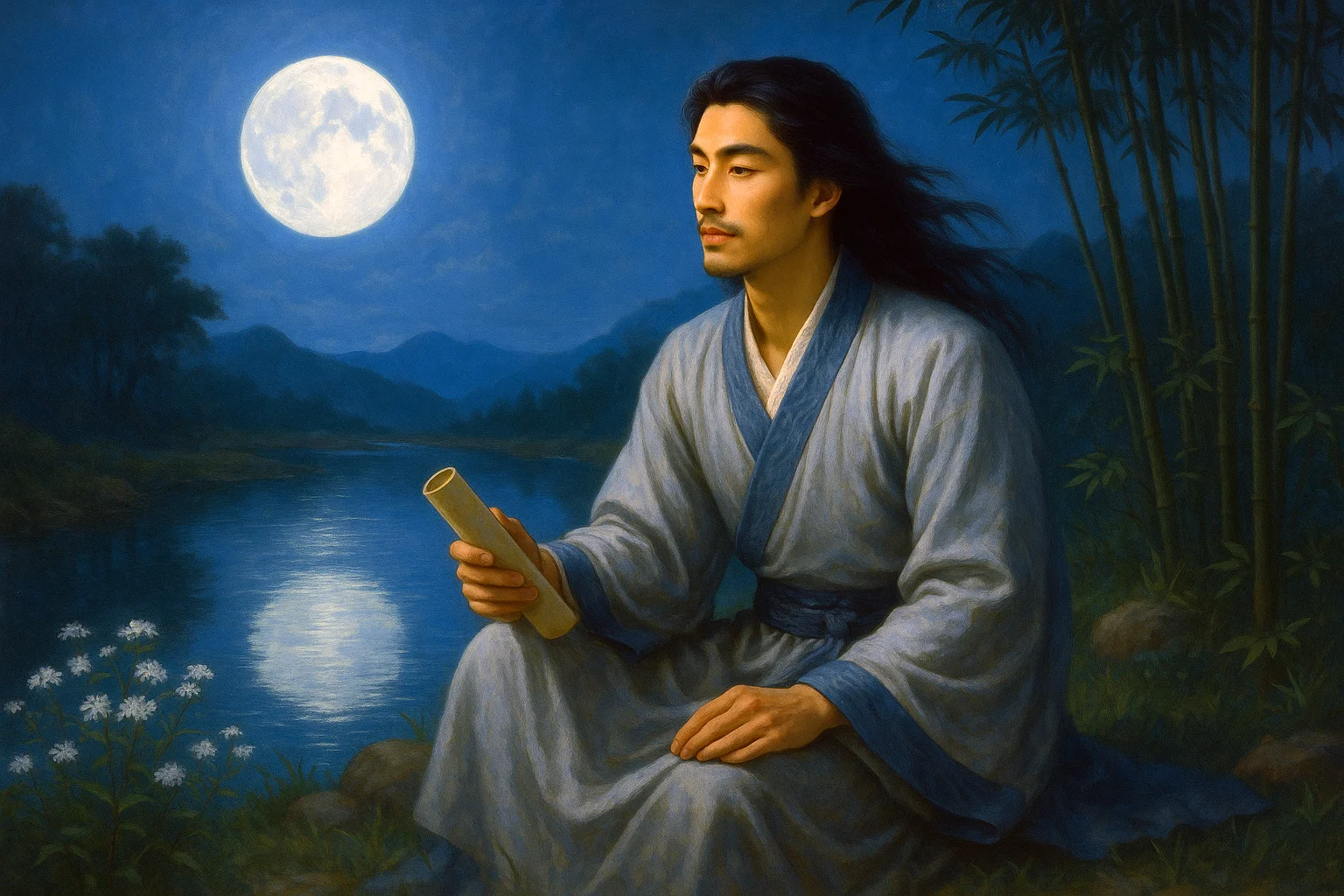
Zeng Gong (曾巩, 1019 - 1083), a native of Nanfeng in Jiangxi province, stands among the illustrious "Eight Great Masters of Tang-Song Prose." His writings distinguished themselves through an elegant classical balance, celebrated for their rigorous argumentation and refined literary craftsmanship. While his poetry embraced an artless subtlety, his prose achieved what critics hailed as "the very essence of purity" - an achievement that, though perhaps less dazzling than his contemporaries like Su Shi or Wang Anshi, earned him posthumous reverence as the founding master of the "Nanfeng Literary School."







